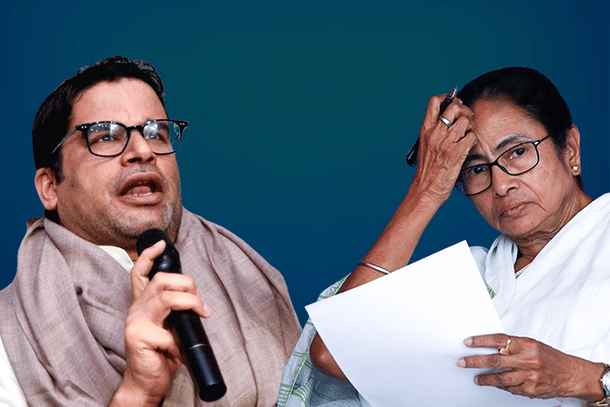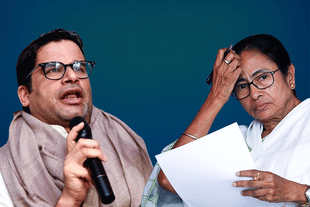Politics
Far From Being An Asset, ‘Team PK’ Could Well Turn Out To Be Trinamool’s Liability
Jaideep Mazumdar
Aug 14, 2020, 01:18 PM | Updated 01:18 PM IST
Save & read from anywhere!
Bookmark stories for easy access on any device or the Swarajya app.


After the rude jolt that the Lok Sabha election results delivered to the Trinamool last summer, the party’s yuvraj — Mamata Banerjee’s nephew and heir apparent Abhishek Banerjee — roped in political strategist Prashant Kishor to save its sinking fortunes.
The strategist, better known by his initials ‘PK’, met Trinamool chief Mamata Banerjee behind closed doors for over two hours in early June last year.
Abhishek Banerjee was the only other person present at that meeting which ended with PK being engaged to script a political and administrative strategy for the Trinamool’s turnaround ahead of the state assembly polls due in about nine months from now.
Since then, PK and his I-PAC (Indian Political Action Committee) team have been working hard, corporate-style, to help Mamata Banerjee stave off the stiff challenge mounted by Bharatiya Janata Party (BJP).
Over 3,500 full-time and part-time IPAC workers have gone around, and are stationed in, various parts of Bengal to collect feedback from the people and help PK frame appropriate strategies.
PK and his team correctly assessed right in the very beginning — it wouldn’t have taken a genius to figure that out anyway — that many in Bengal were very unhappy with the Trinamool and the performance of the state government.
Apart from corruption within the Trinamool’s ranks, an unresponsive bureaucracy and a disconnect with the masses were identified as the basic reasons for the alienation of people from the Trinamool.
It was on PK’s suggestion that Mamata Banerjee launched the Didi Ke Bolo channel of communication to allow people air their grievances and ask for help.
While the initiative did create a buzz initially, it soon fizzled out. Most of the complaints received by the IPAC team manning the Didi Ke Bolo helplines were about corruption and malpractices by Trinamool functionaries.
It was on his suggestion that she tried to distance herself from her party functionaries, who were perceived to be corrupt and asked them to return the 'cut money' (commissions or bribes) they had taken from people.
This campaign backfired when thousands of Trinamool functionaries, including its MLAs and panchayat members, got besieged by angry masses demanding return of the commissions the former had taken.
PK’s strategy was not a well-thought-out one.
“Asking her partymen to return cut money amounted to a public acknowledgement that Trinamool was corrupt. People also started asking what action she is taking against her corrupt partymen apart from merely asking them to return their ill-gotten wealth,” said BJP national secretary Rahul Sinha.
But despite it backfiring, PK continued with this strategy. As allegations of misappropriation of foodgrains for the poor and relief for the Amphan cyclone-affected poured in, Mamata Banerjee asked her party functionaries to mend their ways and return the relief money they had pocketed.
Public perception about the Trinamool being mired in graft only strengthened, and people were not the least bit impressed with Mamata Banerjee’s apparent bid to showcase her own honesty.
“People are not fools. Everyone knows that a substantial part of the cut money taken by a Trinamool functionary goes to the party coffers. Some of them have even said this publicly. Mamata Banerjee was also caught on camera asking party leaders not to pocket all the money they make but donate a percentage to the party,” said state BJP chief Dilip Ghosh.
Not only did this strategy scripted by PK not cut any ice with the masses, it also left a large section of Trinamool functionaries fuming and alienated.
Right from the time PK and his team got to work, many senior and mid-ranking leaders of that party have resented the interference by the ‘outsiders’. They viewed the IPAC workers as encroachers on their turf.
“Conducting surveys and getting feedback through helplines cannot be the basis of chalking out effective political strategies. Fighting and winning elections is not akin to launching a detergent brand,” scoffed a senior Trinamool leader.
Mamata Banerjee has been acting on feedback provided to her by ‘Team PK’ on public perception about even senior Trinamool leaders. Based on such feedback, she has been rewarding them with more responsibilities, or shunting them to the sidelines.
The latest example of that is the recent shakeup in the Trinamool’s ranks that she ordered. Many senior leaders have been kept out of an apex seven-member steering committee and a 21-member coordination committee that have been formed.
Many senior leaders have been given high-sounding but unimportant posts that have little to do with preparing for the assembly elections next year. Obviously, all these leaders are fuming and may sabotage the Trinamool’s prospects in their own turf.
“Bringing in new faces and replacing veteran and tested party leaders who have delivered in the past is not a wise strategy, and that too when elections are a few just months away,” said a senior Trinamool leader, who was a close lieutenant of Mamata Banerjee until last year.
A few senior ministers are very unhappy and feel that PK will lead Mamata Banerjee to electoral doom.
“A political party is not a corporate entity where performances are assessed by a HR team. PK does not understand this basic difference,” said a senior and popular Trinamool leader, who also holds an important portfolio.
PK’s prescriptions to the Trinamool chief to battle the pandemic also proved to be of little value. According to senior state officials, it was on PK’s suggestions that the Chief Minister formed a number of committees, including the high-sounding global advisory board with MIT economist Abhijit Banerjee as its head.
These committees have remained on paper, and the state’s response to the pandemic has been muddled and inadequate. Trinamool leaders are now blaming PK for misguiding Mamata Banerjee.
The only ‘success’ that ‘Team PK’ can claim is the largely positive coverage, at least in the mainstream media, of the Trinamool and the state government.
But, as the veteran Trinamool leaders who are angry with PK and IPAC say, voters are rarely, if ever, swayed by media reports when they go to the polling booths. Because, as the disaffected minister pointed out, a poll campaign is not an ad campaign for a detergent powder and a voter cannot be treated or does not behave as an ad-inspired consumer.
‘Team PK’ may, thus, be doing the Trinamool and its chief more harm than good.
Jaideep Mazumdar is an associate editor at Swarajya.





